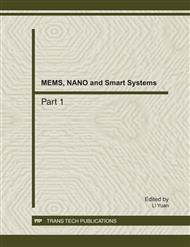p.4794
p.4800
p.4806
p.4814
p.4821
p.4828
p.4841
p.4850
p.4859
Design of Gain Scheduled Multivariable Controllers for a Nonlinear Process
Abstract:
In this paper, Genetic Algorithm is utilized to optimize the coefficients of a decentralized PID controller for a nonlinear Multi-Input Multi-output process by minimizing the Integral Absolute Error (IAE).The controller is tuned at chosen operating points, which are selected to cover the nonlinear range of the process. The optimal PID controller parameters are gain scheduled using a Fuzzy Gain scheduler. The effectiveness of the proposed control scheme has been demonstrated by conducting simulation studies on a Continuous Stirred Tank Reactor (CSTR) process which exhibits dynamic nonlinearity
Info:
Periodical:
Pages:
4821-4827
Citation:
Online since:
November 2011
Authors:
Price:
Сopyright:
© 2012 Trans Tech Publications Ltd. All Rights Reserved
Share:
Citation:


